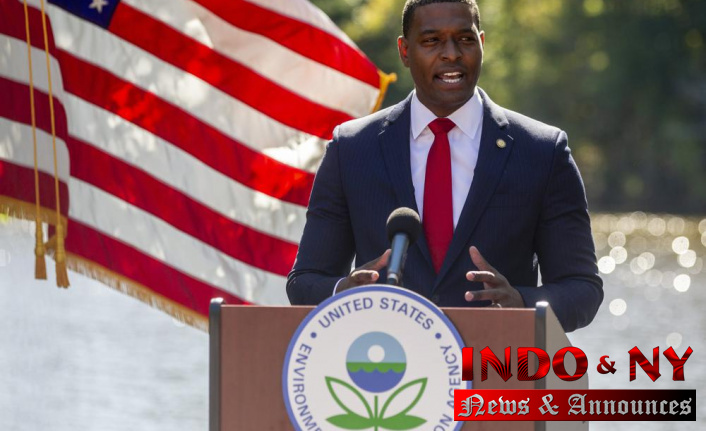Michael Regan, head of the Environmental Protection Agency said that his agency has taken a number of steps to reduce pollution from a group of long-lasting chemicals known collectively as PFAS. These chemicals are increasing in food, water, and public drinking water systems.
According to the Defense Department, it is working to clean up PFAS-contaminated areas throughout the country. Meanwhile, the Food and Drug Administration will increase testing of food supply to determine Americans' exposure to PFAS. The Agriculture Department will also increase efforts to address PFAS contamination of food.
This plan is designed to limit PFAS's release into the environment, accelerate cleanup at PFAS-contaminated sites like military bases, and increase research investments to find out more about where PFAS can be found and how they can be prevented from spreading.
Regan stated that "This bold strategy starts with immediate actions" and also includes additional steps "that will continue through this first term" for President Joe Biden in an interview with The Associated Press. "We will use every tool we have to limit human exposure to toxic chemicals."
Because they are so persistent in the environment, PFAS have been called "forever chemicals". They have been linked to serious health conditions such as cancer and a reduced birth weight.
Per- and Polyfluoroalkyl Substances are short for per-, polyfluoroalkyl substances. They are used in nonstick pans, water-repellent gear, stain resistant rugs, and many other consumer products. These chemical bonds are so strong they won't break down or slow down in the environment. They remain in a person’s bloodstream for indefinite.
The EPA announced Monday that it will set drinking water limits for PFAS in accordance with the Safe Drinking Water Act. It will also require PFAS producers to disclose the toxicity of their products. The agency will also declare PFAS hazardous substances under the Superfund law, which allows it to make companies responsible for contamination pay for cleanup or to do it themselves.
These actions will allow the EPA to make cleanups more safe and "the polluter pays," Regan stated.
The announcement was welcomed by environmental and public health groups. Since long, advocates have urged the EPA, FDA and Pentagon to take action on PFAS.
Thousands of people have reported PFAS chemicals in their drinking water. Nearly 400 military installations have also been found to have PFAS, according the Environmental Working Group, a advocacy and research organization.
Scott Faber, senior vice president of the group, stated that "no one should have to worry concerning toxic forever chemicals in their water tap water." Faber stated that the group is thankful to the Biden administration for fulfilling the president's promise to address PFAS.
The American Chemistry Council represents major chemical companies and said that it supports strong, science-based regulation of chemicals including PFAS substances. However, the group stated: "All PFASs are different, and they shouldn't all be regulated in the same way. The EPA Roadmap emphasizes the differences among these chemistries, and suggests that they should not be grouped together. We expect and hope that federal actions will follow sound science.
This regulatory strategy is being considered by Congress as it considers broad-ranging legislation to establish a national drinking standard for certain chemicals called PFAS and to clean up contaminated sites throughout the country.
The House passed legislation that would establish a national drinking-water standard for PFAS. It also directed the EPA in developing discharge limits for a variety of industries suspected to have released PFAS into water. The Senate has blocked the bill.
Rep. Debbie Dingell (D-Mich.), the House bill's lead sponsor, applauded EPA's announcement and stated that cleanup of PFAS-contaminated areas must be initiated immediately.
She stated that PFAS and their dangerous effects have been known for many years. "Today, the federal government made a commitment, to the American people, that these chemicals can not be ignored anymore."
Dingell stated that even with EPA's action, Congress must still approve legislation to regulate and clean-up PFAS. She stated, "It is time for the Senate act."
Regan, a former North Carolina regulator, was elected head of the EPA in March. He said he witnessed firsthand how dangerous PFAS could be in his state.
Regan was North Carolina's top environment official and led negotiations that led to the cleanup of Cape Fear River. The river had been hazardously contaminated with PFAS industrial chemicals that were released from a DuPont spinoff.
Regan said that he spent time talking with families and their concerns about the agency's plans. He announced it at a Raleigh news conference. "I spoke to mothers concerned about the long-term effects on their children and caregivers wondering if the Fayetteville Work plant's PFAS release had any connection to the terminal illnesses of their loved one.
He added, "So there's a real sense urgency."
Regan praised North Carolina's enforcement efforts, but he said that the state would be in a better position if the federal government was a stronger partner.
He stated that the EPA, under his leadership, has done "more in eight months" in PFAS issues than any administration in four years.
Regan stated that officials expect a rule on PFAS in drinking waters by 2023. Regan stated that he would work as fast as possible to establish safe drinking water limits.
Regan stated that PFAS action will not be taken "on the backs" of the American people. "We hold the polluters responsible, and we're using all of our statutory power to ensure that they pay for their actions."












